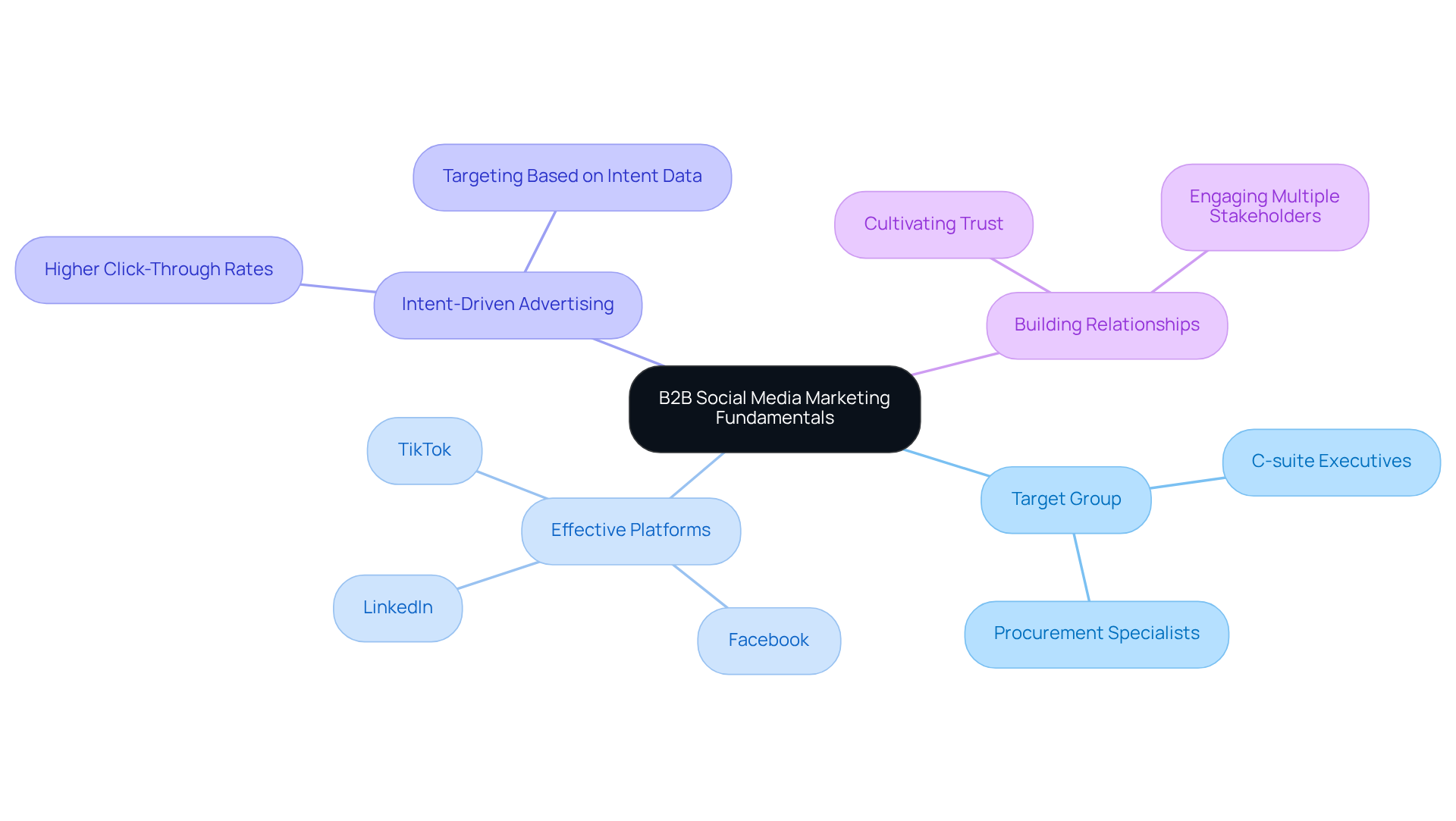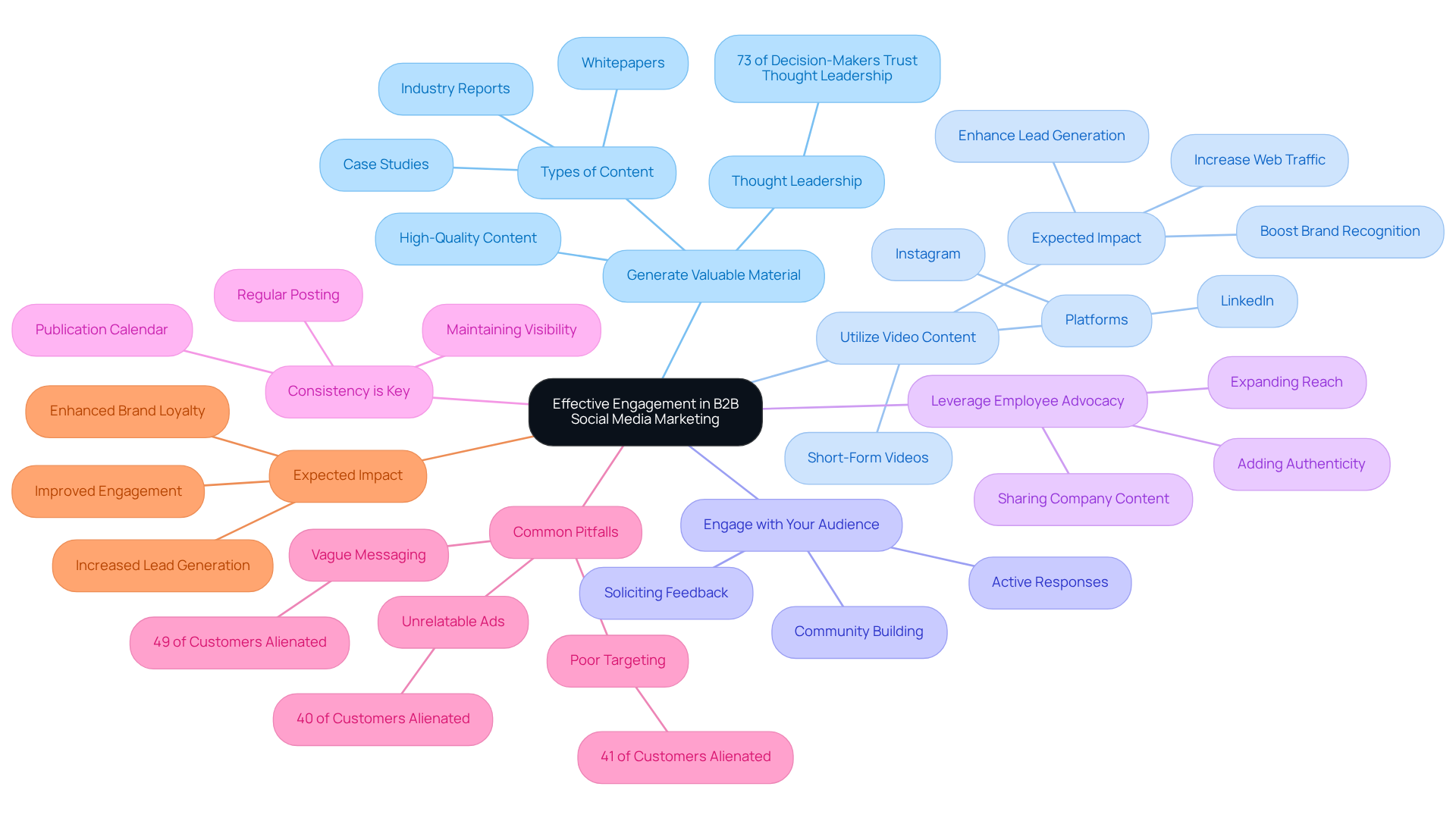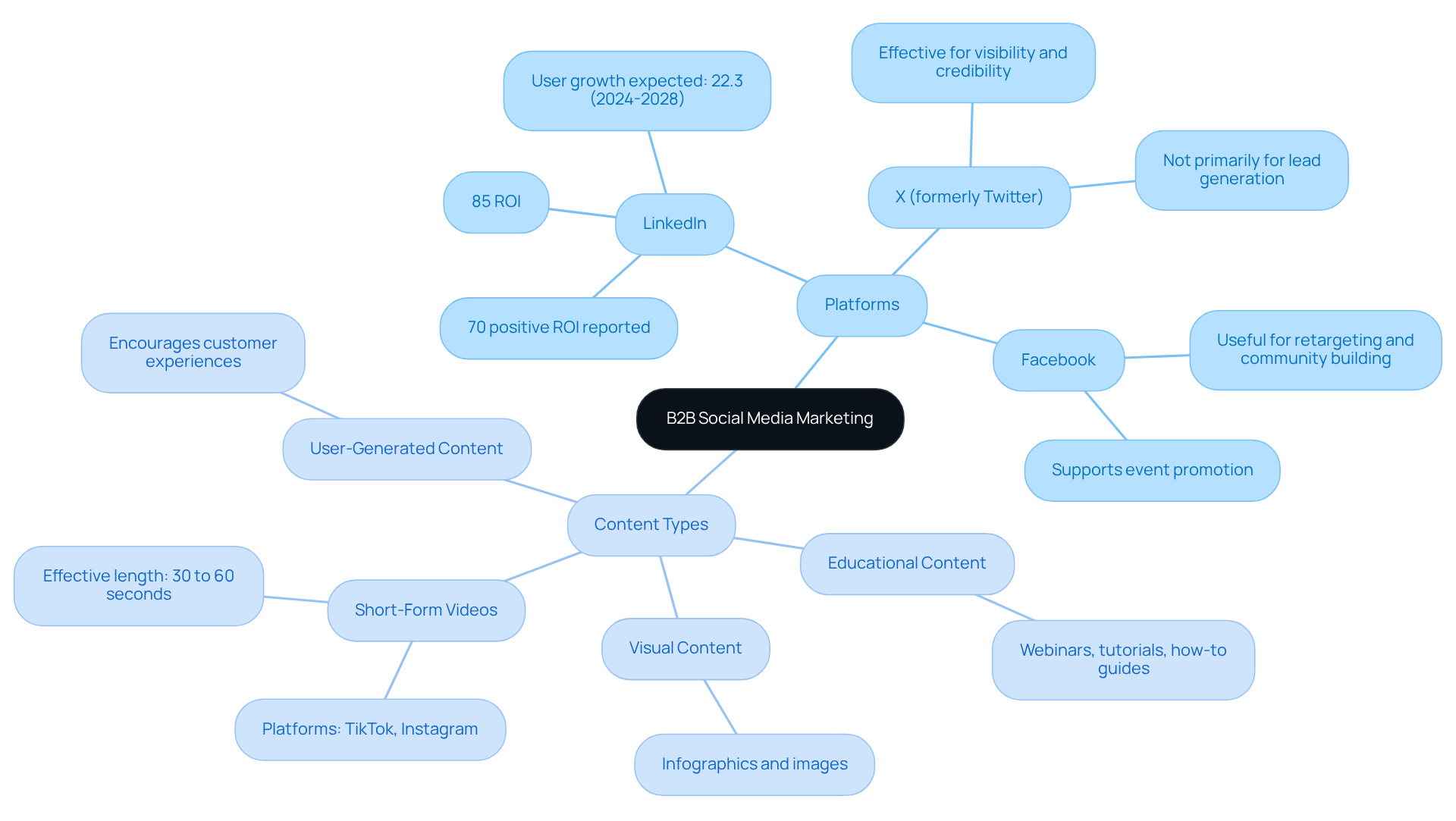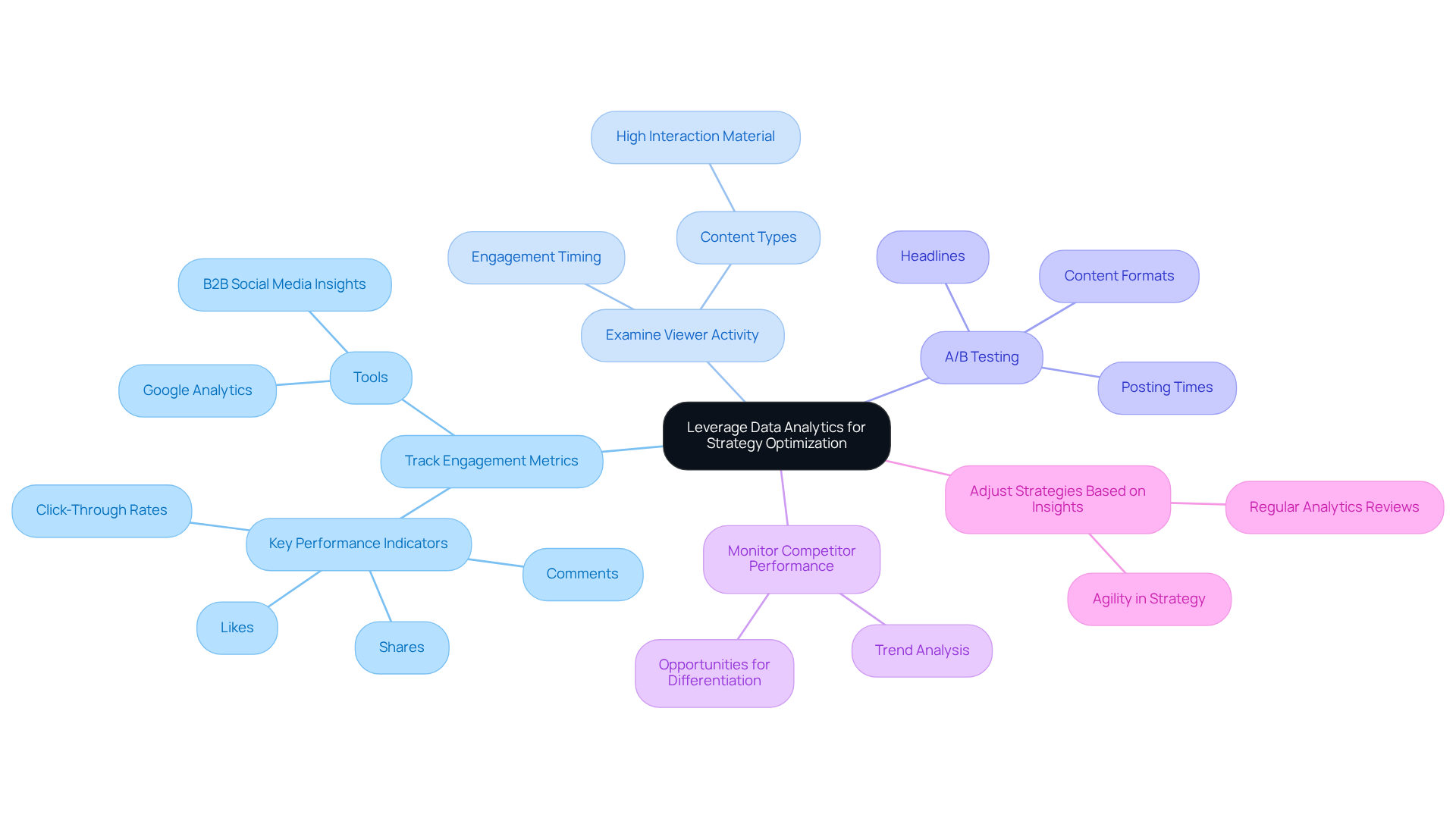Overview
B2B social media marketing demands a strategic emphasis on engaging decision-makers through tailored content and effective platform utilization, with LinkedIn as the primary focus due to its high ROI. This article underscores best practices that include:
- Generating valuable material
- Utilizing video content
- Leveraging data analytics to optimize strategies
These approaches not only enhance engagement but also significantly improve lead generation, demonstrating the potential for substantial returns on investment in this arena.
Introduction
B2B social media marketing is not just evolving; it has become an indispensable tool for businesses seeking to engage decision-makers and drive meaningful interactions. By grasping the unique dynamics of this landscape, marketers can unlock strategies that not only elevate visibility but also cultivate significant relationships with their target audience. Yet, amid the vast array of platforms and content types, the pressing question remains: how can businesses adeptly navigate this intricate terrain to ensure their messaging resonates and delivers tangible results?
Understand B2B Social Media Marketing Fundamentals
B2B social media marketing focuses on engaging with companies instead of individual clients. It is crucial to comprehend the target group, typically composed of such as C-suite executives and procurement specialists. Effective B2B social media marketing strategies leverage platforms like LinkedIn, where professionals actively seek industry knowledge and networking opportunities.
For example, brands employing intent-driven advertising on LinkedIn have reported click-through rates up to five times higher, underscoring the platform's efficacy in reaching key decision-makers. Furthermore, cultivating relationships and trust is essential, as purchasing decisions frequently involve multiple stakeholders and intricate considerations.
By grasping these fundamentals, marketers can tailor their strategies to align with the specific needs and preferences of their targets, ultimately enhancing engagement and achieving successful outcomes.

Implement Key Best Practices for Effective Engagement
To enhance engagement in , consider the following best practices:
- Generate Valuable Material: Prioritize high-quality, informative material that directly addresses the pain points of your target audience. This can encompass whitepapers, case studies, and industry reports, as 73% of decision-makers consider thought leadership materials more reliable than conventional promotional resources.
- Utilize Video Content: Short-form videos are particularly effective in capturing attention and driving engagement. Platforms like LinkedIn and Instagram are ideal for sharing product demos, behind-the-scenes insights, or expert interviews. Video material is expected to be vital for B2B marketing in 2025, boosting brand recognition, web traffic, and lead generation.
- Engage with Your Audience: Foster a sense of community by actively responding to comments, participating in discussions, and soliciting feedback. This two-way communication builds trust and strengthens relationships with your audience.
- Leverage Employee Advocacy: Encourage employees to share company content on their personal profiles. This strategy not only expands your reach but also adds authenticity to your messaging, making it more relatable to potential clients.
- Consistency is Key: Regular posting is essential for maintaining visibility and keeping your followers engaged. Creating a publication calendar can assist you in organizing and timing posts efficiently, guaranteeing a consistent stream of valuable material that connects with your audience.
Common Pitfalls: Be aware of common pitfalls such as vague messaging and poor targeting, which can alienate customers. Ensuring clarity and precision in your content plans is crucial.
Expected Impact: By implementing these best practices in B2B social media marketing, you can expect improved engagement, increased lead generation, and enhanced brand loyalty, all of which are critical for success in the manufacturing sector. Market Veep's customized promotional strategies are designed to help you achieve these outcomes effectively.

Choose Appropriate Platforms and Content Types
Choosing the right platforms is crucial for effective B2B social media marketing. LinkedIn stands out as the premier choice, with 85% of marketers indicating it provides the highest ROI for B2B engagement. Other platforms, such as X (formerly Twitter) and Facebook, can also be effective, especially when customized for particular segments of users.
When considering content types, the following are particularly impactful:
- Educational Content: Webinars, tutorials, and how-to guides establish your brand as a thought leader, providing valuable insights that resonate with your audience.
- Visual Content: Infographics and images simplify complex information, enhancing shareability and engagement across platforms.
- User-Generated Content: Encouraging customers to share their experiences fosters credibility and trust, making your brand more relatable.
- Short-Form Videos: Platforms such as TikTok and Instagram excel in providing quick, engaging material that captures attention and drives traffic, with 39% of marketers identifying 30 to 60 seconds as the most effective video length.
By strategically utilizing these platforms and formats for B2B social media marketing, B2B marketers can improve their engagement and foster significant interactions with their target audiences.

Leverage Data Analytics for Strategy Optimization
To elevate your B2B social media marketing strategy, leverage the power of data analytics through the following methods:
- Track Engagement Metrics: Regularly monitor key performance indicators such as likes, shares, comments, and click-through rates to evaluate the effectiveness of your material. Utilizing tools like Google Analytics and insights from b2b social media marketing yields valuable data for informed decision-making.
- Examine Viewer Activity: Utilize analytics to pinpoint when your viewers are most engaged and which types of material generate the highest interaction. This insight will guide your posting schedule and overall strategy, ensuring alignment with viewer preferences.
- A/B Testing: Implement A/B testing by experimenting with various content formats, headlines, and posting times. Analyzing the results will help you identify what resonates best with your audience, allowing for a more tailored approach.
- Monitor Competitor Performance: Keep a close eye on competitors' social media strategies to uncover trends and identify opportunities for differentiation. Understanding their successes and setbacks in B2B social media marketing provides critical insights for your own campaigns.
- Adjust Strategies Based on Insights: Conduct regular reviews of your analytics to discern what is effective and what requires adjustment. Be agile in your approach, ready to pivot your strategy based on these insights to maintain engagement and foster growth.
As Clive Humby aptly stated, 'Data is the new oil,' emphasizing the immense value that data possesses in shaping effective b2b social media marketing strategies. Furthermore, Market Veep's proven track record, including a 3X increase in organic traffic and a 25% increase in organic leads for manufacturing clients, exemplifies the effectiveness of data-driven strategies in practice. Finally, be wary of common pitfalls in data analytics; as Michael Stonebraker noted, "Without clean data, or clean enough data, your data science is worthless.

Conclusion
B2B social media marketing stands as a formidable tool, concentrating on the engagement of businesses rather than individual consumers. Grasping the intricacies of this strategy is essential for marketers who seek to connect with pivotal decision-makers, including C-suite executives and procurement specialists. By harnessing platforms such as LinkedIn and deploying tailored strategies, businesses can markedly elevate their engagement levels and drive successful outcomes.
This article delineates crucial practices for effective B2B social media marketing, encompassing:
- The generation of valuable content
- The utilization of video
- Audience engagement
- The maintenance of consistency
It underscores the significance of selecting appropriate platforms and content types that resonate with the target audience while accentuating the role of data analytics in refining strategies. By monitoring engagement metrics and adjusting tactics based on insights, marketers can fine-tune their efforts to more effectively address the needs of their clients.
Ultimately, the importance of B2B social media marketing resides in its capacity to cultivate meaningful connections and stimulate business growth. As the landscape perpetually evolves, adopting these best practices and leveraging data-driven insights will be imperative for companies striving to excel in a competitive arena. Taking decisive action now to implement these strategies can yield enhanced engagement, heightened lead generation, and enduring brand loyalty in the ever-shifting domain of B2B marketing.
Frequently Asked Questions
B2B social media marketing focuses on engaging with companies rather than individual clients, targeting decision-makers such as C-suite executives and procurement specialists.
LinkedIn is the most effective platform for B2B marketing, as it is where professionals actively seek industry knowledge and networking opportunities.
Brands that use intent-driven advertising on LinkedIn have reported click-through rates up to five times higher, indicating the platform's effectiveness in reaching key decision-makers.
Relationship building is crucial in B2B marketing because purchasing decisions often involve multiple stakeholders and complex considerations, making trust and rapport essential.
Marketers can improve their strategies by understanding the specific needs and preferences of their target audience, which will enhance engagement and lead to successful outcomes.











